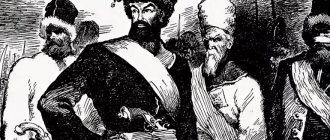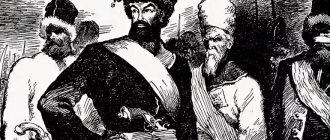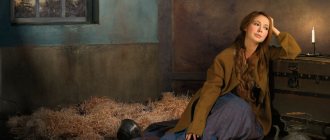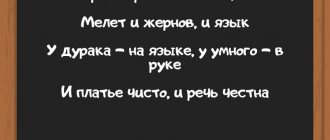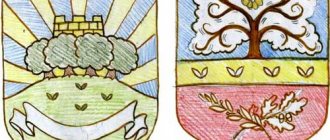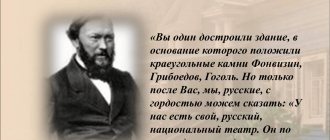Article on the topic: “Proverbs in the story by A.S. Pushkin “The Captain’s Daughter” article (8th grade)
Article on the topic: “Proverbs in the story by A.S. Pushkin "The Captain's Daughter"
A proverb provides an opportunity to define a particular phenomenon for practical purposes and to evaluate it. This explains the ideological and emotional intensity of the proverb. Proverbs have no author. We will never know the exact time of its appearance or place of creation. A proverb is a viable genre of oral folk art widespread in all centuries. In no other genre of folklore is folk life reflected so widely and multifacetedly as in proverbs. They can well be called an encyclopedia of folk life.
Let's look at the proverbs and sayings in the story by A.S. Pushkin "The Captain's Daughter".
"Debt good turn deserves another"
A dashing dog has at least a tuft of hair. (Chapter 9 “Separation”, p. 227). Savelich pronounces the proverb.
The horses are strangers, the collar is not yours, don’t stop driving. (Chapter 2 “Counselor”, p. 177). The proverb is pronounced by the coachman.
I went to see my godfather and ended up in prison. (Chapter 2 “Counselor”, p. 174). Used by Savelich when he is angry at Pyotr Grinev for playing cards.
There is no master for sin. (Chapter 3 “Fortress”, p. 184). The proverb is said by captain Vasilisa Egorovna about Shvabrin.
A bad peace is better than a good quarrel, and if it’s not honest, it’s healthy. (Chapter 4 “Duel”, p. 191). The proverb is pronounced by Ivan Ignatyich regarding the duel between Grinev and Shvabrin.
The story is no reproach for the young man: the horse has four legs, but he stumbles. (Chapter 5 “Love”). Savelich uses this proverb when he writes a letter to Andrei Petrovich, trying to justify Pyotr Grinev for his actions. Every person can make a mistake. The proverb is based on comparison.
My head is in your power: if you let me go, thank you; God will be your judge if you execute. (Chapter 7 “The Uninvited Guest”, p. 223). This proverb is pronounced by Grinev when talking with Pugachev. Grinev wants Pugachev to let him go to Orenburg. With the proverb, he wanted to say that everything is in Pugachev’s hands, let him do as he wants.
The morning is wiser than the evening. (Chapter 11 “Rebel Settlement”, p. 240). The proverb is pronounced by Pugachev.
Let's have a snack, drink - and lock the gate! (Chapter 12 “The Orphan”, p. 246). This proverb is used by Pugachev about the wedding of Masha and Peter.
Go to all four directions. (Chapter 8 “The Uninvited Guest”, p. 223). The proverb is pronounced by Pugachev. He tells this proverb to Grinev.
The Lord will not give you away, the pig will not eat you. (Chapter 6 “Pugachevism”, p. 205). The proverb is used by Ivan Ignatich.
In the speech of the characters, proverbs are presented unevenly; often, but not always, it depends on the social status of a particular character. The laconic farewell message of Grinev the father, for example, is couched in proverbial form: “Don’t ask for service, don’t talk yourself out of service; and remember the proverb: take care of your dress again, but take care of your honor from a young age.” It is not without reason that the epigraph to the entire story is connected with the “father’s word” - “Take care of honor from a young age.” In a letter to an old comrade and friend, General R., to whose service Grinev the father sent his son, he advises to “keep a tight rein” on his rake (chapter 2). In the speech of other characters of noble origin (Shvabrin, Zurin, Masha Mironova and others), proverbs are not found at all. But they are numerous and appropriate when creating characters from the common people.
In the story by A.S. Pushkin's "The Captain's Daughter" reveals Pugachev's ideal of life as an expression of the beliefs of the people. Pugachev is in the center of Pushkin’s attention because in him, the spokesman for the hopes and aspirations of the people, the national character is clearly manifested. This explains Pushkin’s widespread use of fairy tales, songs, and proverbs to reveal Pugachev’s views and beliefs. In the story, proverbs adorn the language of many of the characters in the story, and above all, the leader of the peasant masses, Pugachev. Pugachev is a bearer of folk ideas, he is also an expert and bearer of folk art. Proverbs and sayings in his mouth are not only a means of decorating the language, but also a special “code”, a weapon in the fight against enemies.
The scene of the conversation between the counselor and the owner of the inn makes a great impression. This mysterious conversation looks like a kind of proverb game. But this is not a game, but a serious political conversation. Outwardly harmless and simple proverbs are filled with deep symbolic meaning.
“The owner took a damask and a glass out of the stall, walked up to him and looked into his face: “Ehe,” he said, “you’re in our land again!” Where did God bring it?” My counselor blinked significantly and answered with a saying: “He flew in the garden, pecked hemp; Grandmother threw a pebble - yes, it missed. Well, what about yours? “Yes, ours,” answered the owner, continuing the allegorical conversation. “They started ringing for vespers, but the priest didn’t say: the priest is visiting, the devils are in the graveyard.” “Be quiet, uncle,” my tramp objected, “there will be rain, there will be fungi; and if there are fungi, there will be a body.”
In almost every chapter where Pugachev appears, his proverbs are heard: “I’m having tea, the sky seemed like a sheepskin,” “Whoever is a priest is a dad,” “Even if he’s seven spans in his forehead, he won’t escape my judgment,” “Debt payment is red", "Morning
the evenings are wiser,” “Let’s have a snack, drink, and lock the gate!”, “Execute like this, execute like that, favor like that: that’s my custom.”
And Savelich will say, as he seals: “So he went to his godfather, but ended up in prison,” “There was no reproach for the young man: the horse has four legs, but he stumbles,” “From the frying pan into the fire.”
Captain Vasilisa Egorovna in few of her speeches also does not do without a “red word”: “There is no master for sin” (about Shvabrin), “A girl of marriageable age, what is her dowry? A fine comb, a broom, and an altyn of money, something to go to the bathhouse with” (about Masha).
Characters such as the crooked old man in an officer's uniform, Ivan Ignatich, or the coachman, are episodic, but their speech is also clearly characteristic due to the use of proverbs. Ivan Ignatich says: “A scolding does not hang at the gate,” “A bad peace is better than a good quarrel, and dishonest is healthy.” Coachman: “Probably: the horses are strangers, the collar is not yours, drive, don’t stand!”
The proverbs reflected the innate quality of the Russian people noticed by Pushkin: a distinctive feature in our morals is some kind of cheerful cunning of the mind, mockery and a picturesque way of expressing ... "
In “The Captain's Daughter” A.S. Pushkin uses 20 proverbs, 3 of them as epigraphs.
Thanks to folklore formulas and rhythms, Pushkin’s text acquires the national flavor of Russian speech; proverbs convey the rules by which the heroes of the story live (“Take care of your honor from a young age,” “Debt pays well”).
Characteristics and image of Pugachev from “The Captain’s Daughter”
The Peasant War of 1773-1774, called the Pugachevschina, causes a lot of controversy among historians. Alexander Pushkin addressed it in his work, presenting the reader with his own vision of history.
The characteristics and image of Pugachev in the story “The Captain's Daughter” will help everyone draw certain conclusions regarding the course of historical events.
Strength of character. Freedom above all
The reader will first meet the leader of the peasant uprising when Pugachev helps Grinev and his old servant get to the inn. It will become clear that this is a person confident in his own abilities. He wants and can command people. The proof is his behavior when he told the driver where to turn and how to go.
“His sharpness and subtlety of instinct”
surprised the travelers. He assumed that people were close, based on the subtle smell of smoke, and he was not mistaken. This fact speaks of his ability to find a way out of a difficult situation, of his freedom-loving spirit. He did not wait in the middle of the field to see if he would be lucky to get out after the snowstorm. The daredevil decided to take a risk.
He does not skimp on words of gratitude to Peter. Calls him Your Honor. Such phrases do not mean at all that he is a flatterer, rather the opposite. Pugachev prefers to tell the truth face to face. He openly told Savelich that the old man should keep quiet when Peter was deciding how to thank the counselor for saving him from captivity in the snow.
Cossack or Tsar Peter III
Pugachev hints that he is a Cossack. “Tea is not our Cossack drink”
, the rebel said to Grinev, asking for a stronger drink.
The letter received by Ivan Kuzmich indicated that a real schismatic, Don Cossack Emelyan Pugachev, had escaped from custody. “He christened himself with the name of the late Tsar Peter III. He gathered a huge gang consisting of peasants, convicts, thieves and murderers. He created an indignation in the Yaitsky villages, and has already taken and destroyed several fortresses, carrying out robberies and capital murders.”
.
He often talks about his love of independence. “God knows. My street is cramped; I have little will"
. He compares himself to a free eagle, which, compared to a raven, lives little, but drinks fresh blood and does not feed on carrion.
Next, his plans include Orenburg. When he releases Grinev there, he asks him to tell the authorities to wait for him and surrender with obedience without a fight, otherwise they will not escape severe punishment. And after that, he intends to take aim at Moscow.
Appearance of Emelyan Pugachev
Grinev often paid attention to his eyes. They immediately showed a sea of emotions. They looked with a grin, then with regret, and sometimes with unfeigned self-satisfaction with their actions. “His face had a rather pleasant, but roguish expression. Two sparkling eyes, they just ran around. There was already some gray visible in his thick black beard. The hair was cut into a circle."
.
He is believed to have been around 40 years old. He had a thin build and broad shoulders. When Petya gave him his sheepskin coat, Savelich noticed that it would be too small for his “shoulders.” His facial features were not repulsive, but even somehow attracted. There was no feeling of anger or cruelty in them.
Weaknesses (clothing, food, alcohol, entertainment)
Despite the fact that Pugachev considered himself a defender of the peasants from the landowners, from their injustice, he himself was greedy for easy money, money, and beautiful clothes.
When he appeared on the territory of the Belogorodskaya fortress, he was dressed smartly, in expensive things. “He was wearing a red Cossack caftan trimmed with braid. A tall sable cap with golden tassels is pulled down over his sparkling eyes."
.
And after he occupied the commandant’s house, he preferred to take a steam bath and eat expensive food.
Cruelty and virtue in one soul
He did not stand on ceremony with those whom he considered enemies of ordinary people who did not want to submit to him and did not recognize his royal power, as he believed.
His companions understand him instantly, respect him and take his opinion into account. It becomes clear that they are afraid of him, they call him father, great sovereign.
Emelyan is not stupid, he understands perfectly well that if the freedom of the robbers depends on his life, they will definitely betray him.
After Ivan Kuzmich called him an impostor and a rebel, he only waved his white handkerchief when his assistants already understood the order. The commandant was killed immediately. He didn’t feel sorry for the old woman Vasilisa Yegorovna either.
But he pardoned Grinev, arguing that he does not forget goodness. After all, Peter did not leave him without gratitude when he saved his life by preventing him from freezing to death in the field.
“You'll see again! Will I still favor you when I get my state!”
.
When Peter says that he cannot promise to serve him, Pugachev will not be angry. He will help him take Maria from captivity and set the lovers free.
Education of the Don Ataman
Pugachev could not write or read. He signed documents and Grinev’s pass in illegible scribbles.
. And when they brought papers to him, he looked at them for a long time, twirled them in his hands, and then said that everything was incomprehensible and demanded the Chief Secretary.
His speeches are simple, absolutely devoid of complex structures and sayings. He often uses proverbs and sayings, turns to folklore, and tells legends.
The rebel and his goals
Many people believed the rebel. Not only robbers, but also ordinary peasants joined his army from all over Russia. Near Orenburg, Prince Golitsyn defeated the Pugachev army.
The leader managed to escape to Siberia. There he gathered new gangs, ravaged fortresses, moved to Kazan, and soon planned to go to Moscow. It was not possible to do what we planned. He was caught and executed.
War is over.
Other materials on the novel “The Captain's Daughter”:
Summary
Image and characteristics of Pyotr Grinev
Image and characteristics of Shvabrin
Image and characteristics of Masha Mironova
The history of the novel
Source: https://frigato.ru/harakteristiki-geroev/1099-harakteristika-i-obraz-pugacheva-iz-kapitanskoy-dochki.html
The image and characterization of Pugachev in the novel The Captain's Daughter by Pushkin essay
“The Captain's Daughter” is a story by Alexander Sergeevich Pushkin, which is entirely dedicated to the peasant uprising of 1773-1774. Although the story takes place in a fictional world, the plot is based on real historical events.
Emelyan Pugachev is an important character and leader of the peasant uprising. Historical stereotypes characterize him as a robber, a ruthless killer and robber, as well as a social criminal.
However, we must not forget that he himself was a very charismatic person who managed to attract a huge number of the population of the Russian Empire to his side. Pushkin in his work emphasizes his qualities such as intelligence, prudence, ingenuity and ingenuity.
In addition, through his actions, he repeatedly showed his wisdom and acted as a prudent leader.
He was not picky about nobles. Such good people as Mironov, his wife and other subordinates were executed, although they treated their serfs well. Any nobleman and landowner automatically became his sworn enemy, and it didn’t matter whether he was good or bad. Pugachev was sincerely true to his ideals and dealt with anyone who violated the freedom of the peasant people.
Pugachev never forgot about those people who showed kindness towards him. Grinev, who during a snow blizzard gave him his hare sheepskin coat and a glass of vodka, received Pugachev’s mercy and help in freeing Maria Mironova when she ended up in Shvabrin’s hands.
We can conclude that the head of the uprising was not such a bad person. He was a simple Cossack who dared to defend the common peasantry.
In addition, Grinev himself noted that Pugachev had a “wonderful” appearance. In relation to his subordinates, he adhered to democracy and behaved like a “good tsar-father.”
He did not punish those who argued with his opinion, but pondered it.
He associated himself with an eagle, which every day “drinks living blood.” His whole life, albeit short, was like the life of an eagle.
The author, using the image of Pugachev, tried to show the image of an ordinary, simple Russian man with a broad soul. Alexander Sergeevich admired his wisdom, courage and strength, but did not share his methods of resolving the conflict. He was an active proponent of reform and believed that violence was not the solution.
Essay on the topic Pugachev
The work “The Captain's Daughter” is of interest to the readership for a reason, since against the backdrop of Pugachev’s uprising the story of the relationship between two young people in love is shown. The author, with all sincerity, portrayed to us the image of a man who led a peasant revolt. How does he appear to us?
From the first pages we see that Pushkin displays his toughness, without hiding the most vile scenes. Episodes that depict the death of innocent people make us angry and disgusted towards him. It was because of his mistake that people died. And it was their fault that they found themselves in his path.
Yes, we can say that Pugachev is an unbearable monster. However, he still makes a favorable impression on us. Together with Grinev, we discover particles of kindness in the tough robber. It is Pugachev’s sympathy and kind attitude towards Grinev and Masha that can explain his disposition towards the loving couple.
In addition, if you listen to his speeches addressed to the peasants, it is clear that he wanted to free them from their difficult lot. After all, not only escaped convicts followed the leader, but also ordinary ordinary people who wanted to change their lives for the better.
From the point of view of Pugachev’s associates, his mercilessness was justified, because the nobility was considered the source of all the disasters of the common people, which means they had to be exterminated.
So, what can we say about Pugachev? Of course, he was a reasonable and competent person, because only a person like him can lead the masses. Pugachev can be compassionate, he has an excellent memory for good deeds. Let us remember the moment when a young nobleman lent his sheepskin coat to a stranger.
And this gift played a decisive role in the fate of Peter. The compassion that Pugachev showed reveals positive traits in him. Naturally, this gives him an excuse for committing atrocities, but it adds a nice touch to his character. Pushkin does not evaluate his personality from only one side.
He simply shows it in all its diversity. There are many moments in the work when we do not like Pugachev, but there are also episodes when we are delighted with his actions. Villainy and generosity, kindness, hatred and sympathy. All this is connected in the character of Pugachev.
He and his comrades receive what they deserve, and the young nobleman is forgiven by the empress.
Option 3
This story from beginning to end is dedicated to the peasant uprising that took place in 1773-1774. Despite the fact that the world in which the events take place was created by the author, real actions are still present there.
One of the main characters in this work is Emelyan Pugachev, the instigator of the rebel movement. Here his image is very similar to the historical one: he is rude, cruel, bloodthirsty. In general, he is a robber and a villain who has killed many innocent people. However, one cannot but agree that he was unique in his own way.
Thanks to his abilities, he managed to attract a large number of the people of Russia to his side. Alexander Sergeevich also highlights some positive qualities of this hero, which were in addition to the negative ones. He has excellent ingenuity, he thinks well, and is able to reason calmly.
By his further actions, he more than once showed wisdom, which not every leader had.
He was almost equally cruel to the nobles. Mr. Mironov, along with his wife and servants, were mercilessly executed by Pugachev. However, these nobles treated the serfs quite well.
But for the leader of the uprising it did not matter whether he was a good nobleman or a bad one. He executed them indiscriminately, including landowners and other gentlemen of higher rank than peasants.
Pugachev destroyed any person who stood up against his movement.
He also showed leniency towards those who treated him kindly. When Grinev presented a gift to Pugachev in the form of his warm sheepskin coat and a bottle of vodka, Emelyan subsequently thanked Pyotr Andreevich. Pugachev helped him deal with Shvabrin when he took Maria Mironova for himself.
Based on the above, we can conclude that Emelyan was not a completely bad person. He also showed kindness and generosity towards those who were also kind to him. He treated his subordinates quite warmly. He was like a kind “king-father”. And he did not execute those people who dared to argue with his opinion, but listened to them.
Pushkin shows in Pugachev the broad soul of the Russian man. But he does not share his bloodthirsty views on the hierarchy of the Russian Empire.
Source: https://sochinite.ru/sochineniya/sochineniya-po-literature/pushkin/obraz-i-harakteristika-pugacheva-v-romane-kapitanskaya-dochka
